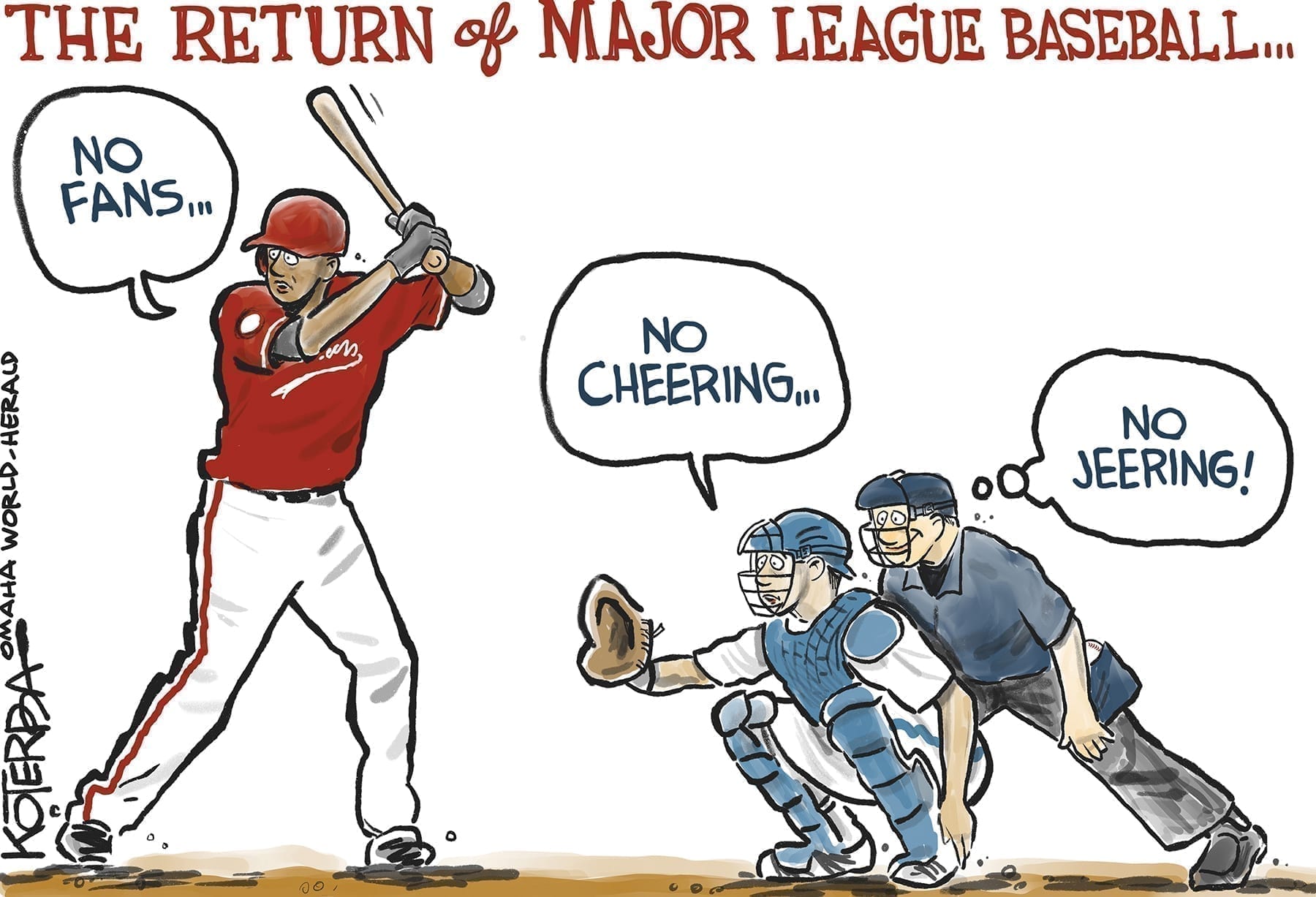
Baseball Players Do a Spit-Take
By Peter Funt
For the virus-plagued season, Major League Baseball has come up with special rules that baseball players will find even more challenging than a sharp slider in the dirt. No showering at the ballpark. No sunflower seeds. No high-fives. In all, the pandemic protocol runs 120 pages.
The rule that is likely to cause the most consternation, however, is the ban on spitting.
Baseball is the nation’s most saliva-oriented sport. You don’t see NBA players spitting on their hands before taking a shot; golfers don’t spit on the green, and I rather doubt that helmeted football players do much expectorating. But spitting is an integral part of the National Pastime.
I know a lot about this. During the 2003 season, I arranged a “Candid Camera” scene in which I pretended to be from the commissioner’s office, and I lectured players on the Yankees about the urgent need to curb spitting – especially in nationally televised games. Every player I met with privately before a game against the Angels was gobsmacked.
“We’ve monitored you spitting 847 times so far this season,” I told the team’s all-star catcher Jorge Posada. He nervously asked me to assure the commissioner he would try to cut back but said it wouldn’t be easy.
A lot of baseball’s rich history of spitting during games stems from players’ passion for chewing tobacco. But ballplayers also have the nasty habit of spitting on their hands before swinging a bat – as if batting gloves, pine tar, and rosin aren’t enough to provide a good grip. Fielders spit into their mitts between pitches – as if oils and creams won’t keep the pocket supple.
Many players simply spit to make a point. Dr. Mary C. Lamia, writing in “Psychology Today” back in 2010, sought to make sense of what she called “the deliberate and unconstrained” act of spitting in baseball. “If spitting can protect a person by evoking disgust in the observer,” she reasoned, “then, given the consequences, it might be considered as an aggressive or contemptuous display… Evoking disgust in another person can be a way to cope with, or disguise, one’s own anxiety.”
Players will now have to find other ways to evoke disgust. Or will they? Are umpires going to enforce the ban on spitting? What sort of penalty will there be for expelling a chewed seed onto the diamond?
Oddly, while ballplayers are forbidden from spitting during games, they will be required to spit before games. MLB is avoiding nasal swabs by using a virus test for which players spit into a tube.
And what about the most famous aspect of the game’s fondness for saliva, the spitball? Loading up the baseball with “foreign substances” was outlawed by Major League Baseball before the 1920 season. That didn’t stop pitchers from doctoring the baseball – it simply compelled them to be more clever about it.
In his 1974 autobiography “Me and the Spitter,” Gaylord Perry detailed how he applied Vaseline to his zipper before dabbing some on the ball – because umpires were disinclined to inspect a player’s crotch area too closely.
As it happens, MLB has addressed the dilemma pitchers will face this summer. Section 5.1 of the new protocol states: “All pitchers may carry a small wet rag in their back pocket to be used for moisture in lieu of licking their fingers.”
Record books will need an asterisk for pitchers who overachieve in 2020 with the baffling ragball.
–
A list of Peter Funt’s upcoming live appearances is available at www.CandidCamera.com.
Peter Funt is a writer and speaker. His book, “Cautiously Optimistic,” is available at Amazon.com and CandidCamera.com. © 2020 Peter Funt. Columns distributed exclusively by Cagle Cartoons, Inc., newspaper syndicate.
Viewpoints and perspectives expressed throughout The Independent are those of the individual contributors. They do not necessarily reflect those held by the staff of The Independent or our advertising sponsors. Your comments, rebuttals, and contributions are welcome in accordance with our Terms of Service. Please be respectful and abide by our Community Rules. If you have privacy concerns you can view our Privacy Policy here. Thank you!
Click here to submit an article, guest opinion piece, or a Letter to the Editor




